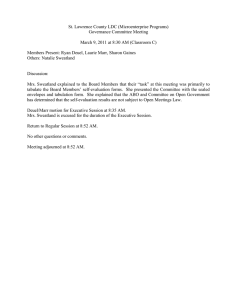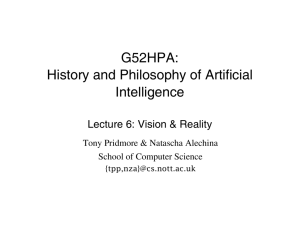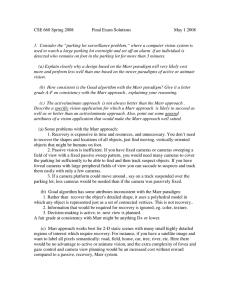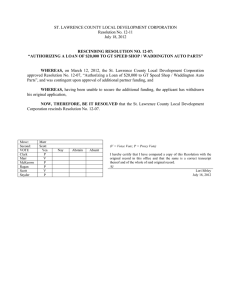Inspection of the learning community surrounding Marr College South Ayrshire Council
advertisement
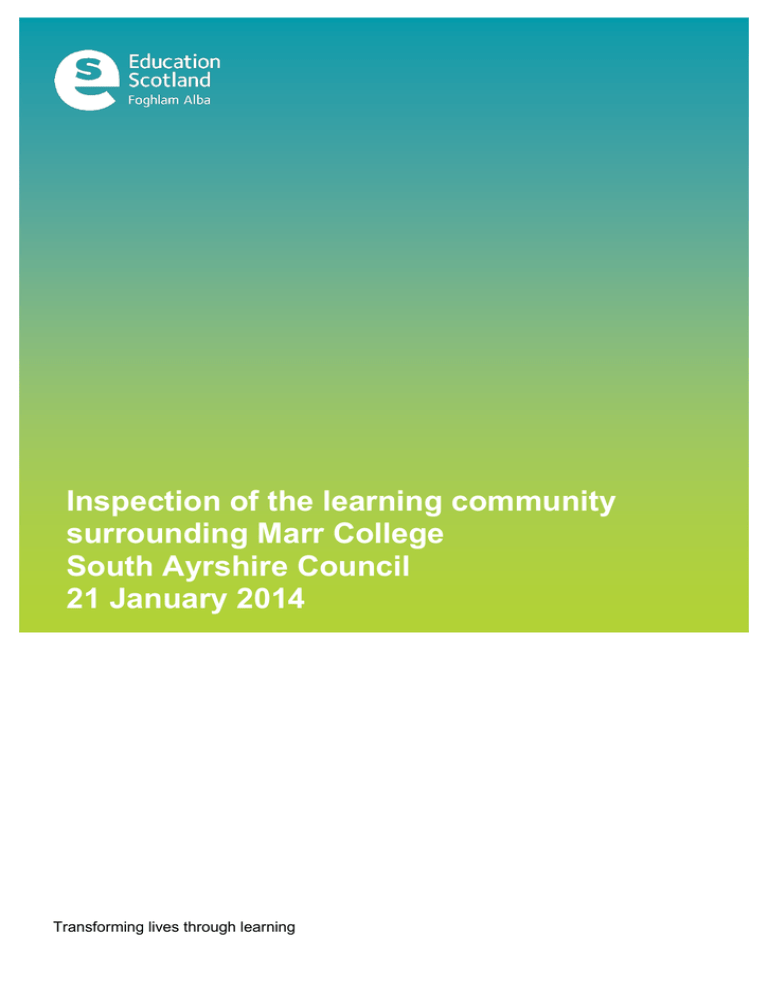
Inspection of the learning community surrounding Marr College South Ayrshire Council 21 January 2014 Transforming lives through learning 1. Context Community learning and development (CLD) partners within the area of Marr College were inspected by Education Scotland during the week of 25 November 2013. During the visit Education Scotland staff talked to children, young people and adults. We worked closely with local CLD managers, CLD providers, partners, paid staff and volunteers. We wanted to find out how well partners are improving the life chances of people living in the community through learning, building stronger more resilient communities and improving the quality of services and provision. We also looked at how well, paid staff and volunteers are developing their own practices and how well partners, including schools are working together. We looked at some particular aspects of recent work which were identified by partners including progress against South Ayrshire Single Outcome Agreement priorities of: supporting children and families; economic recovery, growth and employment; health inequalities and physical activity; caring for older people; and safer and stronger communities and reducing offending. 2. How well are partners improving learning, increasing life chances, promoting and securing wellbeing? Learning community partners are successfully improving learning, increasing life chances and securing wellbeing in the learning community surrounding Marr College. Partners demonstrate strong focus and clear progress against priorities in South Ayrshire’s Single Outcome Agreement. Improving trends are clear in important aspects of work such as community safety, youth achievement and accreditation, participation in physical activity and in employability related services. A developing focus on family learning by primary schools, nursery, library, and CLD service staff is successfully engaging more parents, grandparents and carers in their children’s learning. Families have recently been engaged in Partners in Early Education (PEEP) training at cluster primary schools and nursery classes resulting in improved involvement in their children’s learning and increased levels of confidence. Through NHS Community Food Team, a parents cooking group has been involved in an “eat well to play well” programme resulting in improvement in children’s diets. The Bookbug sessions for parents and children in Troon Library and the Summer Reading Challenge have successfully involved large numbers, resulting in increased levels of reading and library use. High numbers of children in P7 in cluster primary schools are achieving Awards of Ambition. Partnership approaches to support P7 children to be more confident about moving to Marr College are well developed. The well-attended P7 Troon Youth Club successfully enables children to make new friends and involves their parents in the development of provision. Young people S4 to S6 at Marr College volunteer at the club and work effectively as “buddies” to new S1 pupils. As a result children are more confident about settling into secondary school. 1 Young people are achieving very well in the learning community with some outstanding examples of achievement at gold level in The Duke of Edinburgh’s Award and at platinum level in Youth Achievement Awards. Those benefiting most from The Duke of Edinburgh’s Award are skilled and successful learners, confident about moving on to University. Recent decisions to offer Duke of Edinburgh’s Award as a subject choice to all in S3 at Marr College should help to extend opportunities for more young people to develop confidence, extend their skills and achieve awards. Voluntary Action South Ayrshire (VASA) is actively working to ensure that more young people receive recognition of their volunteering through Saltire Awards. Local uniformed youth organisations are working effectively to recognise young people’s achievements. Troon Scouts demonstrate high levels of achievement in The Duke of Edinburgh’s Award and 12 young people in the Troon Boys Brigade have recently achieved the Queen’s Award. Growing numbers are achieving accreditation as Community Sports Leaders and coaches through Active Schools and Community Sports Hub partnership. As a result, more young people are getting involved in an increasing range of sports activities. Learning community partners could benefit from developing a more comprehensive overview of how young people are developing and achieving across all local youth work providers. The Coastal Rowing Project is an innovative project with very strong impact on young people’s achievement, intergenerational learning and the wider community. Young people taking part have achieved strong success through participation in the Duke of Edinburgh’s Award and have learned a range of practical and personal skills through building and rowing a coastal skiff. Adult community members have engaged enthusiastically in the project and have benefited from learning together, getting more involved in the community and passing on important skills to young people. In addition to practical skills in boatbuilding, team work and leadership, participants are developing skills in using computers, developing a website, and using social media. The project has gained international recognition. Members of the group have been invited to speak locally, nationally and internationally. The group have made some links with local businesses which have contributed funding. The group have now put in place an effective infrastructure to develop the Coastal Rowing Club including training local people as coach instructors and developing a handbook and modular programme of coaching to increase community involvement across all age groups A developing focus by partners on improving employment and employability is successfully engaging targeted groups who face barriers to employment. Troon Work Club recently met their target of securing positive sustained destinations for participants. Effective personal and tailored support is helping participants to improve confidence, job application and interview skills. Participants gain SVQ units through Ayrshire College. Transitions to Employment successfully engages with those who are subject to Community Payback Orders and are economically inactive. At Marr College, the “Workout” (enhanced work experience) programme participants are able to clearly identify the benefits that they had gained through their relatively short time within the programme. Taking part in this programme has improved school attendance and behaviour. All those taking part are engaged in a Dynamic Youth Award in working with others. Although recently established, the Youth Employability Hub in Troon provides effective personalised job seeking advice and 2 support. A few young people involved are substantially improving in confidence and are now more able to work with others. Older adults in the learning community benefit from learning to use computers through classes delivered by Marr Trust and through the learning bus. Participants have reduced levels of social isolation and improved ability to use information communications technology to keep in touch with relatives and friends. The 55UP Money Information Service delivered by VASA in partnership with NHS has had a very positive impact on service users’ financial circumstances including increased personal income and reduced debt, and on their health and wellbeing. Overall, the number of adult learners in the learning community is small. Opportunities for adults to gain qualifications locally are not clear. Whilst the proportion of adults in the learning community with no qualifications is much lower than the average for South Ayrshire there are small neighbourhoods within the area which would benefit from targeted work to assess need and demand. Community safety partners work effectively in the area. Significant reductions in the number of reports of youth related incidents of anti–social behaviour are attributed by community safety partners to Friday night diversionary youth groups. A few senior pupils from Marr College improved their knowledge of road safety through the award winning Reckless Driving Wrecks Lives (RDWL) event. Reducing road traffic casalities is an SOA priority. Police figures show a reduction of 37% of road deaths for 16-25 year olds over the last four years. The campus police officer at Marr College is highly regarded by young people as an important source of advice and support. High levels of volunteering by both young people and adults have a strong and positive impact on the learning community. Local churches play an active role in addressing poverty and welfare reform in addition to providing valued youth work services. VASA works effectively with a range of partners and provides effective capacity building training and support to over 40 organisations in the area. Troon Harbour Tenants & Residents Association is a strong example of a successful and well supported community organisation with a committed, confident and skilled core membership. The Association plays a leading role in making the community safer and stronger and improving how the area is perceived by residents and agencies. Members have delivered a range of activities for all age groups to successfully increase involvement in the community including fetes, gala days and trips. They successfully engage people through public meetings, surveys, a website and a community notice board. Members work constructively with local agencies and local councillors and have a strong level of influence. Young people are able to exercise some influence on policy and community planning priorities through South Ayrshire forums. A few local young people are represented in South Ayrshire’s “hot 100” consultative group. Good examples of effective community consultation supported by the Community Engagement Team include the “walk in our shoes road show” delivered by the Senior Citizens Forum. Overall, the influence of local community groups on identifying and agreeing shared local priorities for the area is not sufficiently clear. There is scope for local groups to have 3 a greater say in determining how they will shape local community planning priorities and develop a stronger shared vision for the learning community. 3. How well are partners working together and improving the quality of services and provision? Partners work well together to improve the quality of services and provision in the area. Partnership working is purposeful, focused and supported by a strong positive culture for joint working. Plans link clearly to Single Outcome Agreement (SOA) priorities. CLD workplans set clear and measurable targets. Staff are supported well to reflect on and evaluate their performance. Effective use is made of participant feedback and a management information system enables staff to track performance and identify trends. Partners ability to analyse data and trends is strong. Community safety partners make good use of data, including evaluating the impact of diversionary youth work. Progress is regularly reported to stakeholders using a range of methods including local newsletters and social media. Good participation in effective training and development activities has improved staff ability to evaluate and plan for improvement. Some aspects of joint planning and self-evaluation between learning community partners are at an early stage. The intended formation of a local community learning partnership bringing together all key partners including Marr College could improve partnership planning but this has not yet been formally established. Partners now need to take forward their intention to develop a shared, systematic approach to self-evaluation and planning. There is considerable scope for learning community organisations to be more actively engaged as active partners with Marr College in the planning and delivery of Curriculum for Excellence at both broad general education stage and senior phase. Whilst shared planning is strong against specific SOA priorities, partners and stakeholders have not yet articulated a clear overall shared vision for the learning community. This inspection of learning and development in the learning community surrounding Marr College found the following key strengths: impressive range of opportunities with some outstanding examples of achievement in work with young people; strong culture for partnership working with a clear focus on shared priorities; and highly responsive and solution focused approach across Single Outcome Agreement priorities. We discussed with partners how they might continue to improve their work. This is what we agreed with them: develop shared self-evaluation and planning for improvement in partnership with Marr College; and engage partners and participants in a clearer shared local vision for this learning community. 4 4. What happens at the end of the inspection? We are satisfied with the overall quality of provision. We are confident that the learning community’s self-evaluation processes are leading to improvements. As a result, we will make no further evaluative visits in connection with this inspection. During the inspection, we identified an aspect of innovative practice which we would like to explore further. As a result we will work with the learning community and education authority in order to record and share more widely the innovative practice. Peter Hamilton HM Inspector 21 January 2014 5 Additional inspection evidence, such as details of the quality indicator evaluations, for this learning community can be found on the Education Scotland website at http://www.educationscotland.gov.uk/inspectionandreview/reports/othersectors/com munitylearninganddevelopment/MarrCollegelc.asp . If you would like to receive this report in a different format, for example, in a translation you can contact the administration team on 01506 600381. If you want to give us feedback or make a complaint about our work, please contact us by telephone on 0141 282 5000, or e-mail: complaints@educationscotland.gsi.gov.uk or write to us, addressing your letter to The Complaints Manager, Denholm House, Almondvale Business Park, Livingston, EH54 6GA. Text phone users can contact us on 01506 600 236. This is a service for deaf users. Please do not use this number for voice calls as the line will not connect you to a member of staff. Crown Copyright 2014. Education Scotland 6
